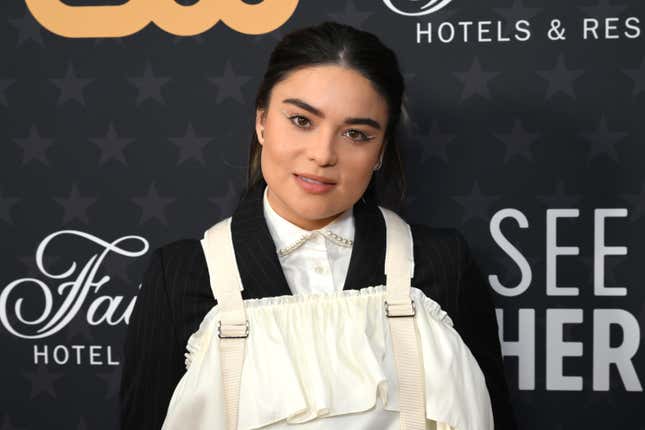
Black people are very familiar with Hollywood’s fascination with portraying the pain and trauma of marginalized communities. While it helps to have those stories acknowledged and told, it can feel like we’ve been reduced to our worst moments. For some Indigenous people, the new Martin Scorsese film Killers of the Flower Moon is bringing up similar feelings. It stars Robert DeNiro and Leonardo DiCaprio as an uncle and nephew who wage a murderous campaign to steal the wealth and land of the Osage people in the early 20th century.
While the film has been a critical success and is expected to be an awards season favorite, there has been backlash from Indigenous communities who feel like it focuses too much on the white characters. On Monday, Reservation Dogs star Devery Jacobs took to X f.k.a. Twitter to post a scathing review of the film, calling it “painful, grueling, unrelenting and unnecessarily graphic,” while also condemning it for its portrayal of its female characters.
“Being Native, watching this movie was fucking hellfire,” Jacobs wrote. “Imagine the worst atrocities committed against [your] ancestors, then having to sit thru a movie explicitly filled [with] them, [with] the only respite being 30 min long scenes of murderous white guys talking about/planning the killings.”
Though she was troubled by the film’s violence and story, Jacobs had nothing but admiration and praise for star Lily Gladstone, as well as the other Indigenous actors in the cast.
“It must be noted that Lily Gladstone is an absolute legend [and] carried Mollie [with] tremendous grace,” she continued. “All the incredible Indigenous actors were the only redeeming factors of this film. Give Lily her goddamn Oscar.”
Despite the strong performances, the Canadian actress noted how a movie about the Osage people still centered around white men, providing them with actual stories. This is something Black people understand all too well, as we’ve seen so many movies about Black history that end up being white savior tropes. Obviously, these characters aren’t saviors, but DiCaprio’s Ernest is presented as the focus.
“But while all of the performances were strong, if you look proportionally, each of the Osage characters felt painfully underwritten, while the white men were given way more courtesy and depth,” Jacobs wrote.
The Echo actress took exception with the gruesome depiction of the deaths of the Osage people, feeling that these scenes lacked “honor or dignity” for the victims, particularly the women. This is yet another notion Black people have had to fight against as filmmakers portray the vicious crimes that have been committed against us. We don’t want to sit through three hours and 26 minutes of a brutal movie about slavery, so I’m sure it was “hellfire” for Devery to watch this film.
“Contrarily, I believe that by showing more murdered Native women on screen, it normalizes the violence committed against us and further dehumanizes our people.”
Like Black people, Indigenous communities are full of teachers, doctors, artists, scientists and entrepreneurs from all walks of life. However, for a very long time, Hollywood has only wanted to showcase the stories of our pain and struggle. Yes, those fights made us who we are, but that’s not all we are, and it’s long past time for the film and TV industry to figure that out.
“I can’t believe it needs to be said, but [Indigenous people] exist beyond our grief, trauma & atrocities,” Jacobs continued. “Our pride for being Native, our languages, cultures, joy [and] love are way more interesting [and] humanizing than showing the horrors white men inflicted on us.”
She went on to question whether Scorsese was the right person to tell this story, questioning the movie’s “white perspective and focus on Native people’s pain.” It’s always a difficult balancing act to get your communities’ stories highlighted on a major platform, while also making sure those same stories are presented in a respectful manner.
“For the Osage communities involved in creating this film; I can imagine how cathartic it is to have these stories and histories finally acknowledged, especially on such a prestigious platform like this film,” she wrote. “There was beautiful work done by so many Wazhazhe on this film.”
Though he ends the movie with a modern scene of the Osage people dancing and drumming, Jacobs feels that it can’t “absolve the film from painting Native folks as helpless victims without agency.”
The actress concludes her scathing rebuke of the movie by wondering if the film really improves on how Indigenous people have presented on screen over the years.
“All in all, after 100 years of the way Indigenous communities have been portrayed in film, is this really the representation we needed?,” she wrote.
Unfortunately, for Devery and other actors who find the film problematic, Killers of the Flower Moon will likely be praised for its representation throughout awards season. There’s nothing award shows love more than showing how enlightened they are. Remember how they all couldn’t wait to celebrate Green Book? Yeah, it’s going to be just as bad for this movie.

